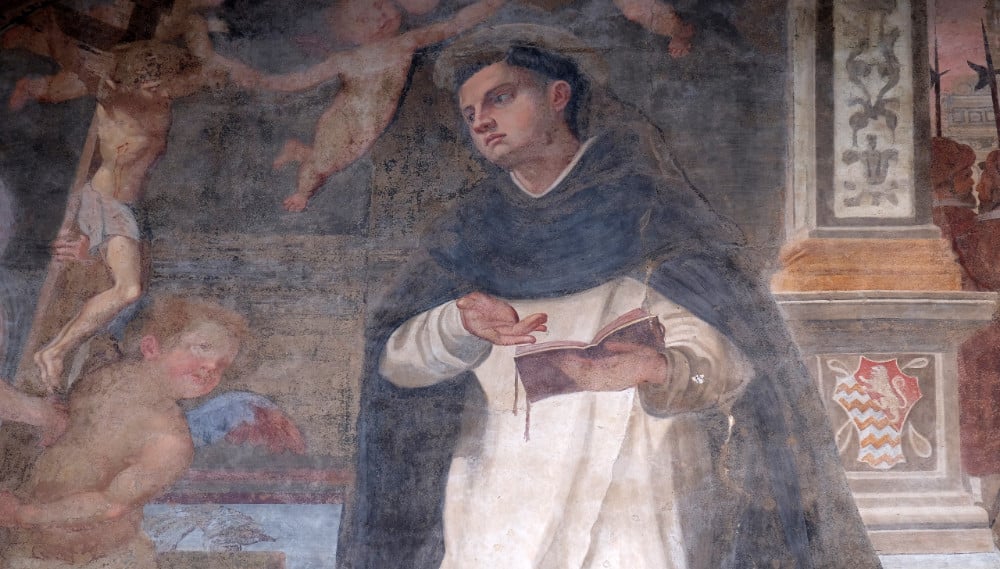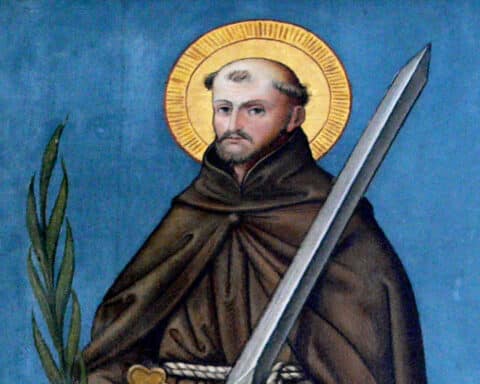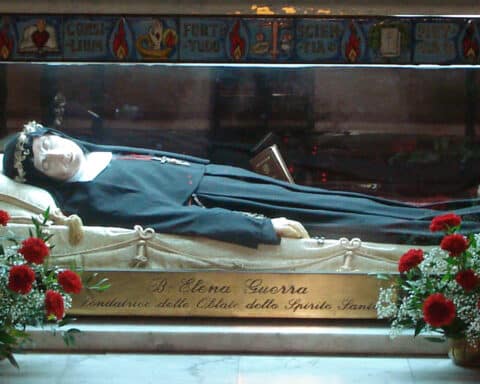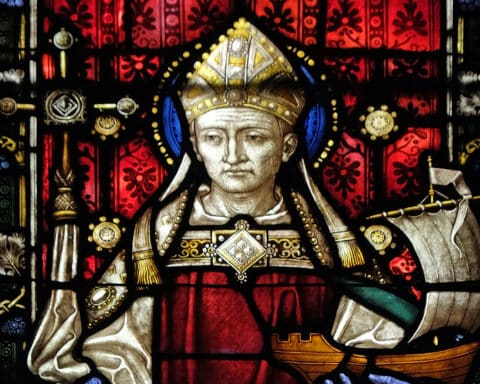The following is the text of the homily given by Father Thomas Petri at the annual University Mass in honor of St. Thomas Aquinas at The Catholic University of America.
While not unique to him, a signature trait of St. Thomas’ life and thought is his insistence that the human person is made to know. We ask questions. He himself, in his most famous work, the Summa Theologiae, asked about 3,100 questions.
Nobody has ever met a young child who doesn’t seem to have a million of them. From the moment we begin to walk and to communicate, we begin to seek and to question. While every child must learn to live in a world with others, every child also seems to know and to trust instinctively that indeed there are answers to the questions and that the answers are out there; they look outward for the truth!
And so begins the lifelong pursuit that eventually leads many to a university, such as this one. It’s more than just a pursuit of facts or figures. It’s the pursuit of knowledge, of truth.
St. Thomas was clear. Our minds can know reality. In fact, that’s one of the ways he thinks about truth. Truth, he says, is the conformity of the mind to reality. Truth is not something we find within. It’s not something we inherently possess.
Lives of learning
Aquinas believed that, made in the image of God, every person is given the capacity and the principles to know, to understand and to retain truths. Even if some people are smarter than others, we’re all capable of learning and knowing.
Learning and knowing higher things like truths about life — its origin and its purpose — or the nature of love and of liberty. Or learning practical truths: how science, medicine, engineering, law and politics serve the common good, and life, and community.
The more we learn, the more we’re open to learning more. It never ends, because truth is never ours. For St. Thomas, it doesn’t become my truth, rather truth possesses me. We become what we know as our minds, and in fact our hearts, conform to what we know. We become theologians, philosophers, scientists, doctors, nurses, engineers, attorneys and politicians.
This understanding of learning and truth is important for St. Thomas, not only because otherwise learning would be circular and merely self-reflective as we descend into a self-centeredness, but more importantly because it means we’re opened up to and dependent on our peers, friends, family, professors, our community and culture, those who have gone before us and on whose shoulders we stand — all of those whose learning on which we depend to move forward ourselves.
Growing in love
As our hearts and minds are conformed, we find we grow in joy and delight in the things and persons we know. We grow in love.
This all leads to an even more important conclusion for the Angelic Doctor. The pursuit of learning is most satisfying when knowledge and truth are sought for their own sake — because this is the fulfillment of what our minds are made for — but this is because truth ultimately leads us not only outward but upward to God, to Jesus Christ, who is the way, the truth and the life.
St. Thomas was optimistic that the pursuits of a student or a learner (which we all are and always remain) can leads us, by God’s grace, to look up and to pursue higher things, the higher life with God, which, in turn, would prompt us to kneel down and pray for understanding, to pray for the wisdom that only God can give — the knowledge of himself that only he can reveal.
It’s the wisdom the Bible speaks of that comes from God — a wisdom in which we come to know him, and come truly to know ourselves because we know him. It’s a wisdom we, therefore, treasure.
Treasuring truth, treasuring Jesus
In treasuring truth, then treasuring God in the knowledge of Jesus Christ that is given to us by the grace of faith, our pursuits become increasingly ordered to the wisdom we receive.
And often, if not always, this progression from questioning child to university student to professional to wise believer is hardly even noticed as it happens. It’s after the fact, that the wise pursuer of truth comes to see that all of his pursuits, all of her pursuits, of authentic learning were, in fact, preparations for the wisdom, indeed for the relationship with God deigns to give.
With apologies to St. Thomas, who would define the term a bit more restrictively than I am here, we might call these pursuits of learning a kind of praeambula Fidei, that is, a knowledge that sort of walks us to the faith.
But if it happens that many or maybe even most students and learners don’t come to the wisdom of grace, this not for the lack of desire on God’s part, or for lack of capability on ours, but because of the sins that plague our world and our lives.
More than what our culture offers
Real learning and the pursuit of authentic truth that satisfies the mind, fulfills the soul and gives joy to the student can be arduous and sometimes unappealing, and so requires patience, discipline and virtue to achieve. This is because we’re weak creatures living in a sinful world.
We live in a culture where packets of information and images that are at best not so useful — or at worst sinful — are available on every screen we see, especially the one we carry around in our pocket. It’s competitive.
The instant gratification of knowing the latest news easily diverts us from knowing the highest truths. If we become what we know, and our minds are conformed to what we learn, then we can also become news junkies, gossips, or worse.
Ask the Father
For those who have come to know God, for disciples of Jesus Christ, we do not face this competition and this challenge alone. We can ask the Father for anything in the Lord’s name, and he will give it to us.
So at the beginning of this new semester here at The Catholic University of America, through the intercession of St. Thomas Aquinas, we ask the Father for this grace: the grace of dedication and preservice in our study and the pursuit of truth that we might be directed by the wisdom of God in all we do so that we might reach the goal and our joy might be complete.
In the Gospel, the Lord promises that there will come a day when we will have no more questions. A day that will fulfill what Jeremiah the prophet once foretold, No longer will there be any need … to teach one another, or to say to one another, “Know the Lord,” because all will know me, says the Lord, from the least to the greatest.
For St. Thomas Aquinas, the patron saint of scholars, students and universities, that’s the goal of learning: to know truth and to be people possessed by truth, yes, but more importantly to come to know God, to be in relationship with Him, so that one day we might live with Him, see Him face-to-face, and know Him who is Truth itself.
On that day, all desire will be satisfied by God, all hearts will be content in Him, and all minds will be filled with Him.
Father Thomas Petri, OP, S.T.D., is president of the Pontifical Faculty at the Dominican House of Studies in Washington, D.C. Follow him on Twitter at @petriop.





